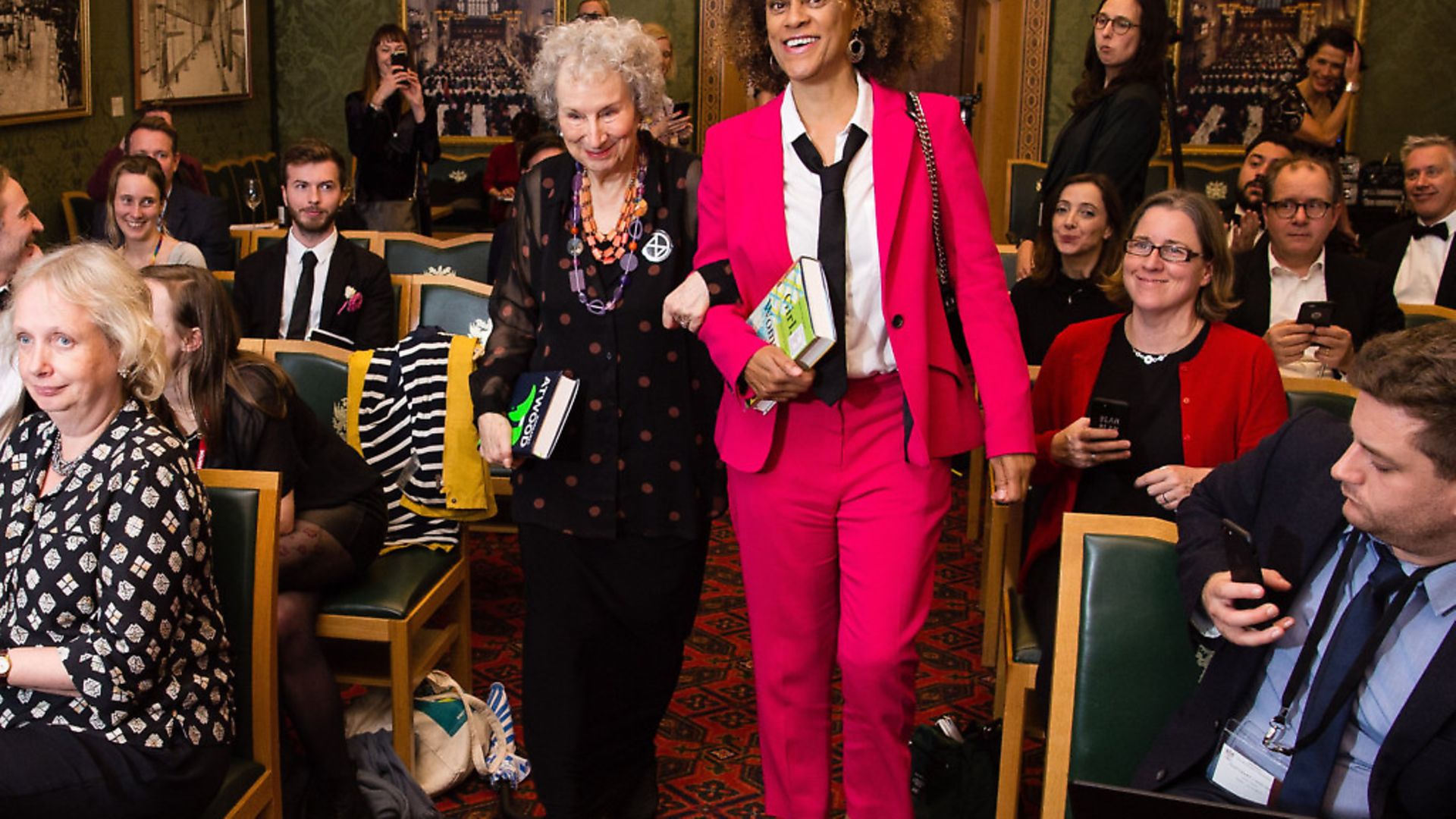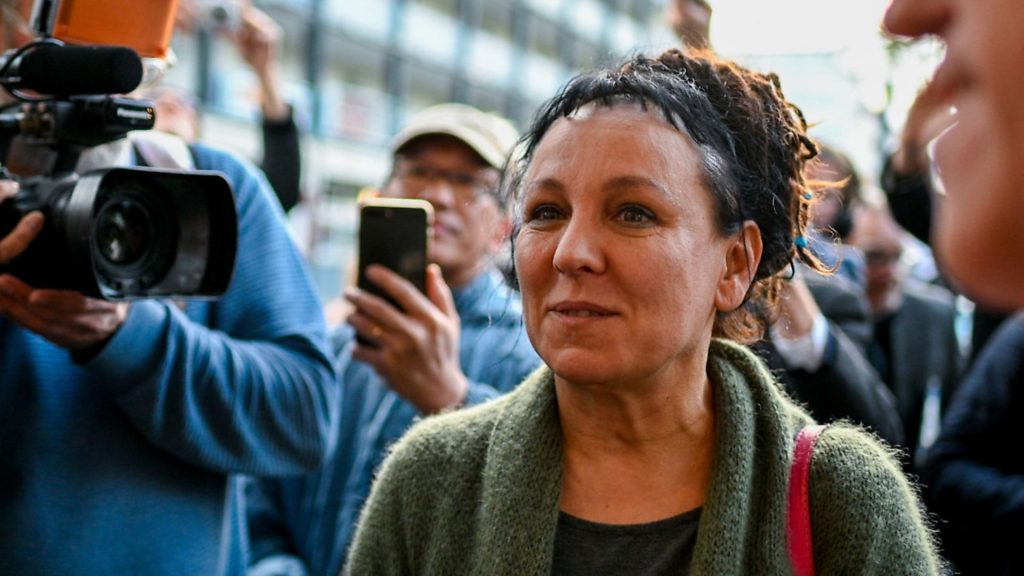
Literary gongs seldom court much controversy. But, as CHARLIE CONNELLY explains, this year is different

Literary awards aren’t often hotbeds of controversy. Announcements of prizewinners rarely see tables upended and a brawl breaking out or people taking to the streets with placards. Winning authors don’t often brandish the award like the FA Cup, give a finger-jabbing speech listing all the bitter grudges they’ve nursed for years then circulate among the tables flicking V-signs at all and sundry, waggling the trophy in the faces of the rest of the shortlist while inviting them to kiss their sweet behind, more’s the pity.
Usually awards ceremonies are little more than a few dolled-up publishing folk getting tiddly on Prosecco, sitting down to a nice dinner then applauding the winner as if it’s the best thing that’s ever happened, whether the author is one of theirs or not (I did once see a winning author in full gushing flow escorted away from the microphone by the MC but that was because he was very refreshed, was thanking everyone he’d ever met by name for the second time and there were still about 25 more awards to go with only a limited amount of wine to get us all through them).
For those of us who have endured this kind of thing, the last fortnight or so has been quite something. There’s been not just one literary award announcement as thrillingly controversial as we’ll ever see, but two. Two! Inside a fortnight! Not only that, they’re the two best-known literary awards in the calendar. Hoo, boy!
First came the award of the Nobel Prize for Literature, about which quizzical eyebrows were already twitching after the deferment of the 2018 award due to a sex and financial scandal involving the high-profile husband of a member of the Academy. This was to be announced on October 10, along with the 2019 award.
Half an hour before the announcement the telephone rang in the Dublin home of the Booker prize-winning author John Banville. He was in the middle of a physiotherapy session for a back complaint at the time, but when the caller identified himself as Mats Malm, the permanent secretary of the Swedish Academy, Banville sat up ramrod straight.
Malm offered hearty congratulations as he imparted the news that Banville had been selected by the Academy as one of the two winners whose public announcement was a matter of minutes away. A delighted novelist listened as the voice on the end of the line proceeded to read out the glowing citation he’d prepared and asked whether Banville had any preference in receiving either the 2018 or 2019 prize.
Straightaway Banville began calling family and friends with the news, only for his daughter to ring back shortly afterwards and tell him she’d just watched the announcement on the television and it wasn’t him. After that call he listened to a voicemail left by the same man saying there had been a “last-minute disagreement” among committee members and he was awfully sorry.
But the man on the phone was not Mats Malm from the Swedish Academy. The call had been a particularly nasty hoax.
Banville reacted with extraordinarily good grace considering he’d believed for a full 40 minutes that he was being awarded literature’s highest global accolade, concluding that the hoax hadn’t necessarily been perpetrated against him personally but at the Academy itself.
“I think he assumed that I would believe him and make a big fuss in the newspapers and say this is another dispute within the jury,” he said. “I think that’s what he expected me to do because that would embarrass the Academy.”
Perhaps most intriguingly the number from which the man had called was a Swedish one based inside the Academy, even though the voice the author heard was, Banville established afterwards, nothing like that of Mats Malm.
If that wasn’t bad enough, the announcement of the genuine winners, Olga Tokarczuk for 2018 and Peter Handke, had its own streak of controversy running through it. Tokarczuk’s award was about the only straight-down-the-line, can’t-argue-with-that part of the whole business.
The Polish author, championed regularly in these pages, is one of the finest writers to come out of Eastern Europe in the last 20 years, with the English translation of her novel Flights winning the Man International Booker Prize last year and her latest work to be translated into English, Drive Your Plow Over the Bones of the Dead, receiving deserved praise on both sides of the Atlantic.
Only the 15th woman among the 116 writers awarded the prize since its inception in 1901, Tokarczuk’s work, which usually focuses on the displaced and marginalised, has made her a pariah in some Polish quarters, not least the current hard-right Law and Justice Party government. In response to the author’s loud criticisms of his party – which have led to death threats and even calls for her to be deported – Piotr Glinski, Poland’s minister for culture, boasted recently that he has never read a word of anything written by Tokarczuk, making the congratulatory statement he released shortly after the announcement ring a little hollow.
The city of Wroclaw meanwhile, where Tokarczuk has a home, had no such qualms about hailing her success, announcing free travel on public transport for anyone carrying one of her books for the week following the announcement.
While book lovers travelled around Wroclaw for free and far-right Poles fumed, however, adverse reaction to Handke’s award was building up a considerable head of steam. Few would dispute Handke’s merits as a writer. A German-Slovenian by birth but now a long-term resident of Paris, his notable works include 1972’s The Goalkeeper’s Fear of the Penalty and A Sorrow Beyond Dreams, a heartrending 1975 novella inspired by his mother’s suicide.
There is a strong argument for his being considered for a Nobel laureateship on the strength of those two works alone. The trouble is, Handke was an open and high-profile admirer of Slobodan Milosevic, visiting the former Serb leader and indicted war criminal in detention at the Hague as he awaited his trial and then not only attending his funeral but standing up and giving a eulogy.
“I think he was a rather tragic man. Not a hero, but a tragic human being,” Handke said of Milosevic in 2006, adding, “I am a writer and not a judge.”
Handke has also been known to indulge in fatuous whataboutery at best, denial at worst concerning Serb atrocities such as the Srebrenica massacre during the Balkan conflicts of the 1990s. When a journalist once cited mass graves as proof of Serbian atrocities Handke barked “stick your corpses up your arse” and in a Belgrade television interview declared the persecution of the Serbs to be worse than that of the Jews under Hitler. It’s no surprise, then, that Handke’s selection as Nobel Laureate provoked a flurry of outrage.
“We are dumbfounded by the selection of a writer who has used his public voice to undercut historical truth and offer public succour to perpetrators of genocide, like former Serbian president Slobodan Milosevic and Bosnian Serb leader Radovan Karadzic,” read a statement from PEN America president Jennifer Egan, for example. “At a moment of rising nationalism, autocratic leadership, and widespread disinformation around the world the literary community deserves better than this.”
Malm, the real one this time, responded by emphasising how the award is given purely on literary merit. “It is not in the Academy’s mandate to balance literary quality against political considerations,” he said.
Other critics, while welcoming the overdue selection of a woman writer, pointed out how the awards had gone to white Europeans when earlier this year the committee’s chair Anders Olsson had accepted that the roster of laureates was dominated by western white men to a degree most would find unacceptable.
“We had a more Eurocentric perspective on literature and now we are looking all over the world,” he’d said. “Previously it was much more male-oriented. Now we have so many great female writers so we hope the prize and the whole process of the prize has been intensified and is much broader in its scope.”
After all that excitement Nobel-watchers could be forgiven for wishing we could go back to the far-off, innocent days of 2016 when the biggest controversy in years was the selection of Bob Dylan.
The awards fun wasn’t over yet, however. A week later focus turned to the Booker Prize announcement, the main event of the year for British publishers. This year’s shortlist had been widely-praised for the breadth and depth of its selection, not least four of the six authors being women.
The books ranged from the wildly experimental single-sentence, 1,000-page Ducks, Newburyport by Lucy Ellmann to grand old man of letters Salman Rushdie’s reworking of Cervantes’ Quichotte, leaving no real clear favourite despite the bookies offering 2/1 on The Testaments, Margaret Atwood’s much-anticipated sequel to The Handmaid’s Tale.
On the night itself publishing’s great and good worked their way through their meals while the shortlisted authors fidgeted, made polite conversation and stared glassily into the middle distance just wanting the whole thing to be over. Finally Peter Florence, chair of the judging panel, walked to the microphone and began the customary platitudes about high standards, difficult decision, yadda yadda yadda.
When he began speaking about how it was impossible to separate two of the shortlisted books things threatened to become interesting. And then, they did. Despite it being explicitly against the rules of the competition the judges were awarding the prize jointly to two writers, Atwood and Bernardine Evaristo for her beautifully-crafted Girl, Woman, Other.
The room erupted. Well, in the way that a room full of publishing folk erupts: Some people raised their eyebrows, fixed smiles fixed themselves harder, there was a whispered, “well, now” from somewhere and a round of applause broke out. The two authors made their way to the stage and stood there arm-in-arm, looking out at a sea of frowning faces bathed in the glow of phone screens as everyone in the room frantically thumbed tweets and WhatsApps with the news.
A dead heat had never happened before. Both women were worthy winners – indeed any of the books on the shortlist would have been a justified winner – but the jury, who had read dozens and dozens of books as part of the judging process and had been locked in a room for five hours before the ceremony trying to pick a winner, were adamant they couldn’t separate the claims of The Testaments and Girl, Woman, Other. None of them were shown on the television coverage of the ceremony but presumably torn clothing, black eyes and fat lips abounded when they emerged with their verdict.
Atwood, who’d won in 2000 with The Blind Assassin, and Evaristo, the first black woman ever to win the prize, both gave warm, gracious and, to the relief of the gathered literati, short speeches. They’ll split the £50,000 prize money and bookshops will experience a windfall in extra sales of two titles rather than the usual one. The only downside was that the other four writers can’t even console themselves with the possibility they might have come second.
And thus one of the most jawdropping literary award seasons in publishing history came to an end. There are so far no confirmed reports of free bus travel in either Atwood’s Toronto or Evaristo’s south-east London.









